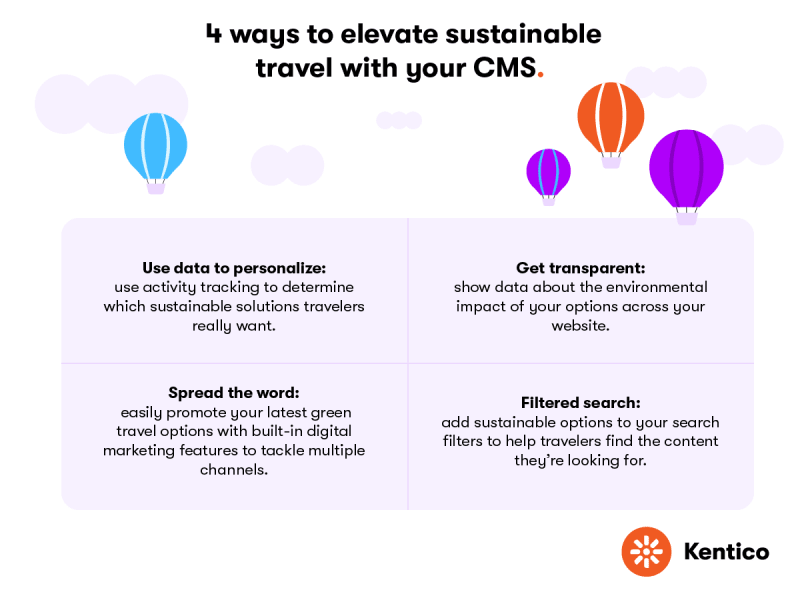Affordability and convenience have traditionally been a priority when vacation planning, but now the desire to minimize environmental impact while vacationing is rising fast. According to the World Economic Forum’s 2023 survey, 76% of travelers want eco-friendly travel options, yet many travelers report feeling lost when trying to figure out the best sustainable options.
We’re looking at how green travel tech solutions are helping eco-conscious tourists find what they’re looking for, from flights to excursions, to enjoy sustainable vacations.
Transparent options for eco-friendly travel planning
Many travelers simply don’t know where to begin while planning an eco-conscious vacation. With thousands of options for flights, accommodation, transportation, and sightseeing; it would take hours to research and figure out the actual environmental impact of each decision. This is where technology and transparency come into play. By using data to highlight low-environmental-impact travel options, you can simplify the process for environmentally aware travelers. Some online booking platforms, like Google Flights, now include features like carbon emission filters to show travelers the environmental footprint of different flight options. This approach lets travelers take control of their environmental impact; no research required.
Data collection for tailored sustainable travel solutions
In the context of sustainable travel, data goes beyond just identifying trends—it’s about protecting the future of environmentally threatened travel destinations. With data collection tools like activity tracking and customizable forms on travel websites, companies can hit two targets with one shot: gather information about what travelers want and identify destinations at risk of environmental degradation.
This data-driven approach helps travel companies to strike a comfortable balance between customer satisfaction and environmental preservation. Peru’s famous Inca Trail leading to Machu Picchu is an example; rather than risk irreversible damage for the sake of tourism, they used data to implement a booking cap for 2024 to protect the site’s fragile ecosystem while letting a certain number of tourists cross the dream destination off their bucket list annually. Tourists will have to be strategic with their travel planning to secure tickets to Machu Picchu, but it’s a fair compromise when considering the alternative. Similar strategies can be adopted globally, so high-demand tourist sites remain intact for future generations.
Reduce waste with digital tools for eco-friendly travel
Waste reduction is a critical aspect of eco-friendly travel. In 2023, 1.3 billion people travelled internationally. Think of all the paper tickets, brochures, maps, or plastic passes and cards that are used briefly and then discarded daily. The solution? Integrating digital passes, e-tickets, QR codes, and mobile wallets into the travel process with eco-friendly travel apps.
Not only do these options eliminate waste, but they also offer convenience for travelers who no longer need to juggle physical documents. This digital solution is already being adapted worldwide in the form of digital vouchers and travel passes. In August 2024, Australia announced their upcoming trial of digital travel passes for entry, with the intention to streamline processes with intuitive integration between airline digital platforms and border control. Japan has followed suit, introducing digital vouchers to consolidate transactions and coupons, together in one application available for download on smartphones.
Use personalization to promote immersive experiences
In an era where personal data drives almost every aspect of customer experience, travel companies can no longer rely on generic one-size-fits-all offerings. Recent reports have found that travelers are increasingly craving more immersive experiences. An effective method for meeting demands is to curate sustainable travel experiences based on an individual traveler’s preferences—as indicated by your website data.
A simple solution is to choose a CMS that offers data-driven personalization to suggest the most eco-conscious travel options your company offers. Whether it’s promoting sustainable hotels, recommending low-emission transportation modes, or offering tours that contribute to conservation efforts, personalization ensures that each traveler feels catered to. This takes the guesswork out of planning eco-friendly vacations, helping tourists confidently choose greener options without sacrificing personal preferences.
AI assistance for easy eco-conscious alternatives
Developments in artificial intelligence have provided convenience for many digital processes, trip planning included. In 2023, Booking.com launched their AI trip planner as a fast solution for environmentally conscious travel planning. The AI tool can analyze vast amounts of data in real-time, quickly identifying eco-friendly accommodations, low-carbon transportation, and sustainable activities. By automating the search for green travel alternatives, AI saves time and ensures travelers are equipped with the most accurate and up-to-date sustainable options, empowering them to make better choices for the environment.
The best way to promote sustainable travel? Use your CMS!

Travelers today engage with brands across multiple touchpoints while planning: websites, mobile apps, social media—it's essential that your CMS can keep up.
Xperience by Kentico offers tools that make it easy to promote sustainability across every channel of communication, making sure your company can meet eco-friendly demands in a new era for travel.
Xperience by Kentico empowers eco-friendly travel through comprehensive customer data management to offer personalized experiences, recommending itineraries, hotels, and activities for eco-conscious travelers. With advanced segmentation, travel companies can precisely target customers interested in sustainability, promoting green initiatives through tailored campaign. Real-time analytics allow businesses to adapt marketing strategies based on traveler preferences, while integration options with third-party systems and built-in marketing tools supports seamless, efficient promotion of environmentally responsible travel options.
Adopting sustainable travel solutions with your CMS no longer just a choice—it’s a necessity for staying competitive and relevant in the tourism industry. Discover more tips for keeping up with travel industry trends and learn winning strategies for promoting eco-friendly travel with your CMS in our latest ebook.


